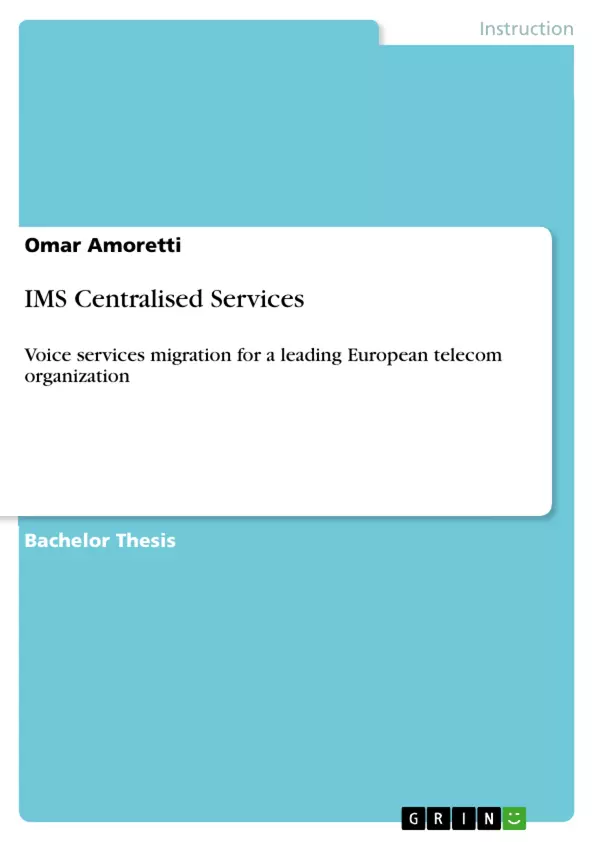
IMS Centralised Services
Bachelorarbeit, 2013
54 Seiten, Note: 1,0
Leseprobe
Inhaltsverzeichnis (Table of Contents)
- Introduction
- Thesis structure
- Motivations behind IMS.
- Motivations from the operator's perspective.
- Motivations from the user's perspective........
- Overview of the IMS architecture ....
- Drivers...........
- IMS horizontal architecture
- Evolution 2G/3G to IMS
- 2G/3G technology features.
- Towards IMS .......
- Intelligent Network (IN) limitations
- From circuit-switched to IMS-based voice services
- Development path 2013 - 2018
- Initial state..
- Intermediate state based on SCP and IM-SSF..
- Service delivery platform and the Service Broker.
- Service Broker benefits.
- Intermediate state setting.....
- Target state 1 based on the SIP AS and rIM-SSF
- Target state 2 based on the SIP AS and the 12 interface...........
- Analysis criteria for IMS-based Voice services
- LTE coverage...
- Handset capabilities ......
- Service consistency.
- Roaming.......
- Standardisation
- SWOT analysis .....
- Refarming and the Digital Dividend
- Further considerations ...
- Major mobile market characteristics
- Consolidation trends
- Regulation and competition
Zielsetzung und Themenschwerpunkte (Objectives and Key Themes)
This bachelor thesis explores the evolution of voice services from the traditional circuit-switched (CS) technology to the IP multimedia subsystem (IMS), focusing on the period between 2013 and 2018. The study analyzes three potential scenarios: an intermediate state and two target states, each with a distinct approach to CS & IP domain mediation.
- Transition from CS to IMS-based voice services.
- Comparison of different IMS evolution scenarios.
- Assessment of IMS-based voice services based on specific criteria.
- SWOT analysis of IMS deployment.
- Analysis of the European mobile market landscape.
Zusammenfassung der Kapitel (Chapter Summaries)
The thesis begins by introducing the concept of IMS, outlining its architectural structure and advantages over existing technologies. The first chapter also details the motivations behind the transition from CS to IMS-based voice services, both from the operator's and the user's perspective.
Chapter 2 provides an overview of the IMS architecture, highlighting its key features and drivers. Subsequently, Chapter 3 explores the evolution from 2G/3G to IMS, analyzing the technology features of earlier generations and the limitations of the Intelligent Network (IN).
Chapter 4 dives deeper into the transition from circuit-switched to IMS-based voice services. The chapter outlines a detailed development path from 2013 to 2018, examining three potential scenarios: an initial state, an intermediate state, and two target states. These scenarios are evaluated based on various criteria, including LTE coverage, handset capabilities, service consistency, roaming, and standardization. The chapter concludes with a SWOT analysis, assessing the feasibility of implementing the intermediate state from a technical and economic perspective.
Chapter 5 delves into the broader context of the European mobile market, analyzing its major characteristics, including consolidation trends and regulatory aspects. This chapter provides a foundation for understanding the market forces influencing the deployment of IMS-based voice services.
Schlüsselwörter (Keywords)
The primary focus of this thesis lies on the IP Multimedia Subsystem (IMS), specifically its centralized services and the evolution path for voice services from 2013 to 2018. Key concepts include circuit-switched (CS) technology, domain mediation, service consistency, standardization, roaming, SWOT analysis, and the European mobile market landscape.
Frequently Asked Questions
What is the main focus of this thesis on IMS?
The thesis explores the evolution of voice services from traditional circuit-switched (CS) technology to IP Multimedia Subsystem (IMS) based services.
What timeframe does the study cover?
The analysis focuses on the development path and mobile market trends between 2013 and 2018.
What are the three scenarios evaluated for IMS transition?
The study evaluates an intermediate state and two different target states for mediating between CS and IP domains.
Why is the transition to IMS important for operators?
Motivations include service consistency, access-agnostic delivery, and overcoming the limitations of legacy Intelligent Networks (IN).
What criteria were used to assess IMS-based voice services?
Services were evaluated based on LTE coverage, handset capabilities, service consistency, roaming, and standardization.
Details
- Titel
- IMS Centralised Services
- Untertitel
- Voice services migration for a leading European telecom organization
- Hochschule
- Fachhochschule Technikum Wien (Electronic Engineering)
- Note
- 1,0
- Autor
- MSc. Omar Amoretti (Autor:in)
- Erscheinungsjahr
- 2013
- Seiten
- 54
- Katalognummer
- V454992
- ISBN (eBook)
- 9783668885011
- ISBN (Buch)
- 9783668885028
- Sprache
- Englisch
- Schlagworte
- IP Multimedia Subsystem IMS evolution path IMS centralised services IMS voice service migration
- Produktsicherheit
- GRIN Publishing GmbH
- Preis (Ebook)
- US$ 20,99
- Preis (Book)
- US$ 29,99
- Arbeit zitieren
- MSc. Omar Amoretti (Autor:in), 2013, IMS Centralised Services, München, Page::Imprint:: GRINVerlagOHG, https://www.diplomarbeiten24.de/document/454992
- Autor werden
- Ihre Optionen
- Vertriebskanäle
- Premium Services
- Autorenprofil
- Textarten und Formate
- Services für Verlage, Hochschulen, Unternehmen

- © GRIN Publishing GmbH.
- Alle Inhalte urheberrechtlich geschützt. Kopieren und verbreiten untersagt.
- info@grin.com
- AGB
- Open Publishing
Der GRIN Verlag hat sich seit 1998 auf die Veröffentlichung akademischer eBooks und Bücher spezialisiert. Der GRIN Verlag steht damit als erstes Unternehmen für User Generated Quality Content. Die Verlagsseiten GRIN.com, Hausarbeiten.de und Diplomarbeiten24 bieten für Hochschullehrer, Absolventen und Studenten die ideale Plattform, wissenschaftliche Texte wie Hausarbeiten, Referate, Bachelorarbeiten, Masterarbeiten, Diplomarbeiten, Dissertationen und wissenschaftliche Aufsätze einem breiten Publikum zu präsentieren.
Kostenfreie Veröffentlichung: Hausarbeit, Bachelorarbeit, Diplomarbeit, Dissertation, Masterarbeit, Interpretation oder Referat jetzt veröffentlichen!
- GRIN Verlag GmbH
-
- Nymphenburger Str. 86
- 80636
- Munich, Deutschland
- +49 89-550559-0
- +49 89-550559-10
- info@grin.com
-









